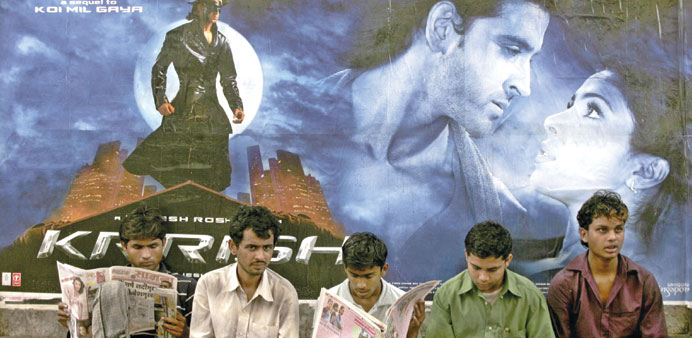Pedestrians sit in front of a poster of Krrish in Mumbai in this June 21, 2006 file photo. The Krrish superhero series and the Dhoom action franchise started as one-offs a decade ago, but the third films in the series released in 2013 earned more than $40mn at the box office.
Reuters/Mumbai
Bollywood is looking for its next superhero, one who can swoop in to amuse audiences in a film industry bereft of fresh ideas. Its name might be Franchise Man.
At least two movie studios in India are focusing on franchises, developing stories that will span three films.
In the past, the Indian film industry has used the term “franchise” loosely. Typically, producers inch their way toward sequels, greenlighting them only when the first film is a hit.
The Krrish superhero series and the Dhoom action franchise started as one-offs a decade ago, but the third films in the series released in 2013, earned more than $40mn at the Indian box office.
Bollywood is hungry for more franchises to repeat that performance. Eros International Media, one of its biggest studios, has launched an in-house production wing to “build franchises with lasting value,” it said in a press release.
Independent studio Abundantia Entertainment recently released Baby, a fast-paced thriller about an elite anti-terrorist squad, which opened to glowing reviews. Work on a second film has begun.
“Franchises are about creating long-lasting brands. If it has worked in other sectors in India, why not entertainment?” said Ajit Thakur, head of Trinity, the Eros wing for franchises.
The studio board includes David Maisel, the former chairman of Marvel Studios, whose comic book characters Captain America and Iron Man were effective movie franchise anchors.
The source of the franchise fervour is Hollywood, where such films are top grossers at the box office. Even in India, the top Hollywood hits over the last three years have been franchises such as Avengers, Spider-Man and Transformers. They have done well because of recall value among young moviegoers.
“India is skipping generations in terms of audience tastes,” said Vikram Malhotra, head of Abundantia Entertainment. He said young adults were aligned to the West in terms of what they watched.
Bollywood is notoriously short-sighted about its content, and studios and producers often back stars rather than scripts. Thakur of Trinity said backing a franchise was risky in an industry that does not believe in long-term planning.
“It is going to be new for the market, thinking like this,” Thakur said. “We will only greenlight a film if the character graph can span three films.”
But it won’t be an easy decision.
“What if the first one doesn’t work?” asks Vijay Krishna Acharya, the writer of all three Dhoom films.

